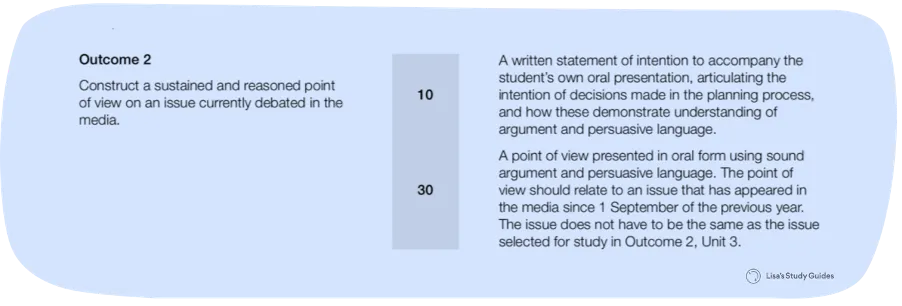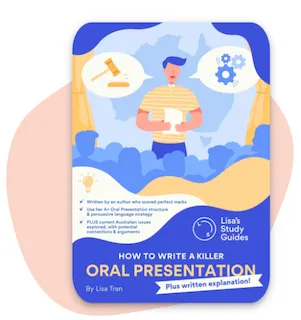Contents
1. What is an Oral Presentation?
2. What are you expected to cover? (Oral Presentation Criteria)
3. Choosing your Topic
4. Choosing your Contention
5. Writing your Speech
6. Presenting your Speech
7. Writing the Written Explanation
8. Resources to help you prepare for your Oral Presentation
What is an Oral Presentation?
For many VCE English students, the oral presentation is the scariest part of the course; it’s often also the first.
Doing a speech can indeed be daunting— you’re marked in real time, you can’t go back and edit mistakes, and the writing part itself is only half the battle. Nonetheless, the Oral SAC can also be one of the more dynamic and engaging tasks you complete in VCE English, and there’s plenty of ways to make it more interesting and also more manageable for yourself.
Keep reading for a comprehensive overview of what you need to know to succeed in your Oral Presentation. We’ve got you covered- from choosing your topic and contention, to writing and presenting your Speech.
We’ll also be suggesting useful resources, Study Guides and YouTube videos that will provide more detailed information and give you more confidence. Let’s get into it!
What are you expected to cover in an Oral Presentation? (Oral Presentation Rubric)
1. Your Oral Presentation SAC has two components. The first is the Oral Presentation itself (“a point of view presented in oral form”), and the second is a Written Explanation, also known as a Statement of Intention.
2. Your selected topic needs to be an issue that has appeared in the media since 1 September of the previous year
3. Your aim for this entire Oral Presentation SAC is to persuade your audience to agree with your contention (whatever that may be) based off the issue you’ve selected.
Here’s the raw version of VCAA’s expectations from you, taken from the VCAA website:

How to choose your Oral Presentation topic
1. Select a topic that has appeared in the media since 1 September of the previous year
This can be time consuming and tricky, especially if you want to choose something a bit more original or fresh.
Firstly, you need an event. An event in the VCE English context is anything that happens which also generates opinionated media coverage—so, it’s not just an event but it has to be an event that people have published opinions about, and they have to have been published since September 1.
You might wonder why we don’t go to the issue straight away. Here’s a hypothetical to illustrate: if you asked me to name an issue, the best I could probably come up with off the top of my head is climate change. However, if you asked me to name an event, I’d pretty easily recall the Australian bushfires—something much more concrete which a) has generated specific and passionate opinions in the media; and b) can easily be linked to a wider issue such as climate change.
The ABC news archive is also really helpful for finding events since you can pick dates or periods of time and see a good mix of news events from then. Otherwise, Wikipedia has helpful pages of events that happened in specific years in specific countries, so “2023 in Australia” might well be a starting point.
When you have your event, you can then look for an issue. This will be a specific debate that comes out of the event, and can usually be framed as a “whether-or-not” question. The bushfires, for example, might generate debate around whether or not the Australian government is doing enough to combat climate change, whether or not Scott Morrison has fulfilled his duties as Prime Minister.
Most importantly, choose an issue from an event that’s interesting and important to you. After all, you’re going to be spending the time researching, writing and presenting!
2. Filter out the boring events/issues
Understand who your audience is.
Once you know who your audience is, ask yourself: Does this event and issue relate to my audience?
This question matters because “your aim of this entire Oral Presentation SAC is to persuade your audience to agree with your contention (whatever that may be) based off the issue you’ve selected.” This means that what you say to your audience and how they respond to your speech matters.
Even if your assessor isn’t counting exactly how many people are still listening to your speech at the end, everyone knows a powerful speech when they’re in the presence of one - it hooks the audience from start to end - and an assessor, consciously or subconsciously, cannot deny that the collective attentiveness of the room has an influence on their marking of your Oral Presentation.
That’s why you should choose a topic that your audience can relate to. Also, avoid topics that have too many unfamiliar words, because as soon as there’s something they don’t understand, it becomes much harder for them to follow your speech.
Now you may be asking yourself; what is the best topic for oral presentation?
Here are some example topics from previous years to give you inspiration:
VCE English Oral Presentation Topics 2014
VCE English Oral Presentation Topics 2015
VCE English Oral Presentation Topics 2016
VCE English Oral Presentation Topics 2017
VCE English Oral Presentation Topics 2018
VCE English Oral Presentation Topics 2019
VCE English Oral Presentation Topics 2020
VCE English Oral Presentation Topics 2021
VCE English Oral Presentation Topics 2022
VCE English Oral Presentation Topics 2023
For more detailed information on choosing a topic, read my blog Choosing a WOW topic for your VCE Oral Presentation
How to choose your oral presentation contention
Once you've chosen an interesting topic and have researched all of its different viewpoints, it's time to formulate your contention.
Often, creating a killer contention is about avoiding some common traps that will make your overall presentation boring, bland and just like the rest of your cohorts'.
So, there are three things I like to AVOID:
1. Broad, Overarching statements
2. A Contention That Is Just Plain Obvious
3. Avoid A Contention That Is Generally Accepted As True In Today’s Age
For more information on writing a contention, read my blog Creating a Killer Contention for your Oral Presentation
How to write your speech
1. Have a CAPTIVATING introduction sentence; use a short, clear and powerful sentence.
2. RELATE to your audience so that it keeps them interested so they actually WANT to listen.
3. If you are taking on a persona, firstly study and UNDERSTAND your character.
4. Don’t forget your persuasive techniques. I usually use repetition in conjunction with the ‘rule of three’.
5. Remember that you are writing a SPEECH, not an essay. Instil your oral with emotion, varied tone and sentence lengths.
In fact, I've talked about a few of these in a 'Must Dos and Don'ts' video. If you haven't seen it yet, watch below before you read on.
4 Tips on Presenting Your Speech
1. Body Language
Confidence is key. Stand with your feet shoulder width apart and, more importantly don’t move your legs. Especially if you’re nervous, swaying or shuffling will be noticeable and make you appear more nervous—when you practise, pay attention to the lower half of your body and train it to stay still if possible.
That being said, do use your arms for gestures. Those are more natural and will help engage the audience, though don’t overdo it either—usually, holding cue cards in one hand frees up the other but also stops you from going overboard.
2. Eye contact
Cue cards brings up another important consideration- eye contact. Hold cue cards in one hand as high as you can without it feeling uncomfortable. This means you don’t have to take your eyes away from the audience for too long or too noticeably to check your notes.
Eye contact increases your engagement with the audience. It also gives the impression of confidence and that you’ve been practicing and know your speech inside and out!
3. Rehearse, rehearse, rehearse
In a best case scenario, you won’t need to rely on your cue cards as you will have your speech basically memorised! Read your speech aloud and pretend that you’re actually delivering your speech. This means:
- Looking up ahead
- Holding the cue cards in the right spot; and
- Not just reading the words, but speaking as if to an audience
It’s extremely helpful to also practice your speech to an actual audience! Practice in front of your family and friends. An alternative is to put a sticker next to your camera and record yourself. The sticker will help indicate where you should create eye contact. Look back at the video and give yourself some feedback, you might be surprised at your presentation!
4. Tone variation
Tone variation involves emphasising certain words, using pauses or slowing down for effect, or modifying volume. Incorporating some of these elements- even writing them into your notes by bolding/italicising/underlining will help you break out of monotony and make the speech more engaging.
Be sure to emphasise emotive language and any evidence you might use to illustrate your arguments. Most importantly, don’t speak too quickly!
5 things to keep in mind while writing the written explanation
For oral presentation based written explanations, the VCAA study design requests students write...
"A written statement of intention to accompany the student’s own oral presentation, articulating the intention of decisions made in the planning process, and how these demonstrate understanding of argument and persuasive language."
Using the topic, 'Why we need to stop crying 'cultural appropriation' when cultural exchange is far more important, ‘let’s see how this can be done with FLAPC with some examples below:
1. Form
2. Language
3. Audience
4. Purpose
5. Context
For more information on writing a Written Explanation and a sample FLAPC compiled and rearranged for flow and fluency, read my blog How to Write a Stellar Written Explanation (Statement of Intention) .
Resources to help you prepare for your Oral Presentation
Doing this study all by yourself can be rather daunting, so we've got your back. We specialise in supporting VCE English by creating helpful videos, study guides and eBooks. Here are some just to get your started:

5 Common Oral Presentation Mistakes
A Three Part Guide to Nailing Your Oral Presentation
Advice for A+ Oral Presentations
How I Got A+ in My Oral Presentation | Live QnA With Lisa Tran
How To 'Overcome' Your Fear of Public Speaking
Oral Presentations | How To Do Speeches
Walkthrough of a Full Scoring VCE Oral Presentation
Our How to Write a Killer Oral Presentation Study Guide has all the information you need to succeed in your Oral Presentations. Sample A+ essays and written explanations are also included!








.jpg)